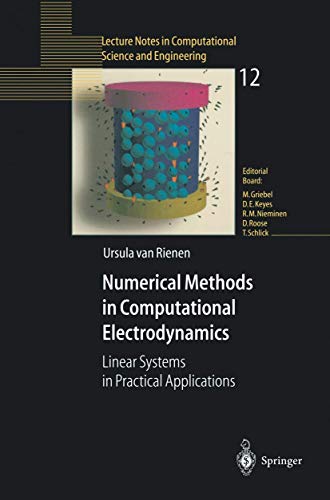Numerical Methods in Computational Electrodynamics: Linear Systems In Practical Applications (Lecture Notes in Computational Science and Engineering, 12, Band 12) - Softcover
Buch 6 von 111: Lecture Notes in Computational Science and Engineering
Inhaltsangabe
This interdisciplinary book deals with the solution of large linear systems as they typically arise in computational electrodynamics. It presents a collection of topics which are important for the solution of real life electromagnetic problems with numeri
Die Inhaltsangabe kann sich auf eine andere Ausgabe dieses Titels beziehen.
Suchergebnisse für Numerical Methods in Computational Electrodynamics:...
Numerical Methods in Computational Electrodynamics
Anbieter: moluna, Greven, Deutschland
Zustand: New. Artikel-Nr. 4898300
Neu kaufen
Versand von Deutschland nach USA
Anzahl: Mehr als 20 verfügbar
Numerical Methods in Computational Electrodynamics : Linear Systems in Practical Applications
Anbieter: Buchpark, Trebbin, Deutschland
Zustand: Gut. Zustand: Gut | Seiten: 400 | Sprache: Englisch | Produktart: Bücher | Keine Beschreibung verfügbar. Artikel-Nr. 716893/3
Gebraucht kaufen
Versand von Deutschland nach USA
Anzahl: 1 verfügbar
Numerical Methods in Computational Electrodynamics : Linear Systems in Practical Applications
Anbieter: Buchpark, Trebbin, Deutschland
Zustand: Sehr gut. Zustand: Sehr gut | Seiten: 400 | Sprache: Englisch | Produktart: Bücher | Keine Beschreibung verfügbar. Artikel-Nr. 716893/2
Gebraucht kaufen
Versand von Deutschland nach USA
Anzahl: 1 verfügbar
Numerical Methods in Computational Electrodynamics
Anbieter: buchversandmimpf2000, Emtmannsberg, BAYE, Deutschland
Taschenbuch. Zustand: Neu. Neuware -treated in more detail. They are just specimen of larger classes of schemes. Es sentially, we have to distinguish between semi-analytical methods, discretiza tion methods, and lumped circuit models. The semi-analytical methods and the discretization methods start directly from Maxwell's equations. Semi-analytical methods are concentrated on the analytical level: They use a computer only to evaluate expressions and to solve resulting linear algebraic problems. The best known semi-analytical methods are the mode matching method, which is described in subsection 2. 1, the method of integral equations, and the method of moments. In the method of integral equations, the given boundary value problem is transformed into an integral equation with the aid of a suitable Greens' function. In the method of moments, which includes the mode matching method as a special case, the solution function is represented by a linear combination of appropriately weighted basis func tions. The treatment of complex geometrical structures is very difficult for these methods or only possible after geometric simplifications: In the method of integral equations, the Greens function has to satisfy the boundary condi tions. In the mode matching method, it must be possible to decompose the domain into subdomains in which the problem can be solved analytically, thus allowing to find the basis functions. Nevertheless, there are some ap plications for which the semi-analytic methods are the best suited solution methods. For example, an application from accelerator physics used the mode matching technique (see subsection 5. 4).Springer Verlag GmbH, Tiergartenstr. 17, 69121 Heidelberg 400 pp. Englisch. Artikel-Nr. 9783540676294
Neu kaufen
Versand von Deutschland nach USA
Anzahl: 2 verfügbar
Numerical Methods in Computational Electrodynamics : Linear Systems in Practical Applications
Anbieter: AHA-BUCH GmbH, Einbeck, Deutschland
Taschenbuch. Zustand: Neu. Druck auf Anfrage Neuware - Printed after ordering - treated in more detail. They are just specimen of larger classes of schemes. Es sentially, we have to distinguish between semi-analytical methods, discretiza tion methods, and lumped circuit models. The semi-analytical methods and the discretization methods start directly from Maxwell's equations. Semi-analytical methods are concentrated on the analytical level: They use a computer only to evaluate expressions and to solve resulting linear algebraic problems. The best known semi-analytical methods are the mode matching method, which is described in subsection 2. 1, the method of integral equations, and the method of moments. In the method of integral equations, the given boundary value problem is transformed into an integral equation with the aid of a suitable Greens' function. In the method of moments, which includes the mode matching method as a special case, the solution function is represented by a linear combination of appropriately weighted basis func tions. The treatment of complex geometrical structures is very difficult for these methods or only possible after geometric simplifications: In the method of integral equations, the Greens function has to satisfy the boundary condi tions. In the mode matching method, it must be possible to decompose the domain into subdomains in which the problem can be solved analytically, thus allowing to find the basis functions. Nevertheless, there are some ap plications for which the semi-analytic methods are the best suited solution methods. For example, an application from accelerator physics used the mode matching technique (see subsection 5. 4). Artikel-Nr. 9783540676294
Neu kaufen
Versand von Deutschland nach USA
Anzahl: 1 verfügbar
Numerical Methods in Computational Electrodynamics: Linear Systems in Practical Applications
Anbieter: Revaluation Books, Exeter, Vereinigtes Königreich
Paperback. Zustand: Brand New. 1st edition. 375 pages. 9.25x6.25x0.50 inches. In Stock. Artikel-Nr. x-3540676295
Neu kaufen
Versand von Vereinigtes Königreich nach USA
Anzahl: 2 verfügbar

